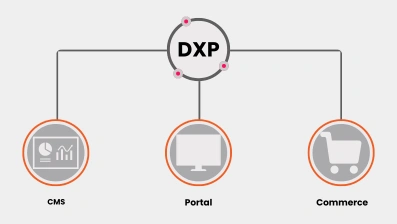In today's digital landscape, understanding customer behavior and optimizing user experiences are paramount for business success.
A digital experience analytics platform (DXA) offers valuable insights into how customers interact with digital channels, enabling businesses to enhance their digital strategies.
These platforms provide comprehensive data on user behavior, engagement, and satisfaction across various touchpoints.
In this blog, we will explore the essentials of digital experience analytics platforms, their benefits, and how to choose the right one for your business.
Whether you're new to the concept or looking to deepen your understanding, this guide will serve as your go-to resource for all things DXA.
Demystifying DXA Platforms
Importance of digital experience is unmatched, so is the role of DXA platforms.
But what are DXAPs?
A digital experience analytics platform (DXA) is a comprehensive tool designed to track, analyze, and optimize user interactions across digital channels.
These platforms provide insights into customer behavior, preferences, and engagement, enabling businesses to enhance their digital strategies and improve user satisfaction.
By aggregating data from various touchpoints such as websites, mobile apps, and social media, DXA platforms offer a holistic view of the digital customer experience.
Key Features of DXA Platforms
User Behavior Tracking:
- Session Recording: Capture user sessions to analyze interactions and identify pain points.
- Heatmaps: Visualize where users click, scroll, and spend the most time on your pages.
Advanced Analytics:
- Real-Time Analytics: Access up-to-the-minute data on user interactions and engagement.
- Custom Dashboards: Create tailored dashboards to monitor key performance indicators (KPIs) relevant to your business.
Segmentation and Personalization:
- Audience Segmentation: Segment users based on behavior, demographics, and other criteria to deliver personalized experiences.
- Personalized Recommendations: Use machine learning algorithms to offer content and product recommendations tailored to individual users.
Conversion Rate Optimization:
- A/B Testing: Conduct experiments to determine which versions of your content or design yield the best results.
- Funnel Analysis: Track user journeys to identify drop-off points and optimize conversion paths.
Integration Capabilities:
- CRM and Marketing Automation Integration: Sync with customer relationship management (CRM) systems and marketing tools to create a unified digital ecosystem.
- API Access: Leverage APIs to integrate with other digital platforms and enhance data flow.
Feedback Collection:
- Surveys and Polls: Gather direct feedback from users to understand their needs and preferences.
- Voice of Customer (VoC) Programs: Implement VoC initiatives to continuously improve the customer experience.
Security and Compliance:
- Data Encryption: Ensure that all user data is encrypted and securely stored.
- Regulatory Compliance: Adhere to data protection regulations such as GDPR, HIPAA, and CCPA.
By utilizing a digital experience analytics platform, businesses can gain deep insights into user behavior, optimize their digital presence, and ultimately drive better outcomes. Understanding these key features can help you select the right platform to meet your specific needs.
Unveiling the Benefits of DXA Platforms
Digital experience analytics platforms (DXA) offer a multitude of benefits that can transform how businesses understand and interact with their customers. .
By leveraging these platforms, companies can enhance their digital strategies, improve customer satisfaction, and drive better business outcomes.
Here are the key benefits of using a DXA platform:
Comprehensive Customer Insights
Understanding User Behavior:
- DXA platforms provide detailed insights into user behavior across various digital channels, including websites, mobile apps, and social media.
- By analyzing click patterns, navigation paths, and engagement metrics, businesses can understand what drives user actions and identify areas for improvement.
- Data-Driven Decisions:
- Access to real-time data enables businesses to make informed decisions quickly.
- Customizable dashboards and reports highlight key performance indicators (KPIs), helping businesses focus on the most critical aspects of their digital strategy.
Enhanced Customer Experience
Personalization:
- DXA platforms support audience segmentation and personalized content delivery, ensuring users receive relevant and engaging experiences.
- Personalized recommendations and targeted marketing campaigns can significantly boost user engagement and satisfaction.
- Improved Usability:
- Tools like heatmaps and session recordings help identify usability issues and areas where users struggle.
- Businesses can use this information to make data-driven improvements to their digital interfaces, enhancing overall usability and user satisfaction.
Increased Conversion Rates
Optimization Tools:
- A/B testing and funnel analysis features allow businesses to experiment with different content and design variations to find the most effective solutions.
- By optimizing conversion paths and reducing friction points, businesses can increase conversion rates and drive more sales or leads.
- Customer Journey Mapping:
- Understanding the complete customer journey helps identify drop-off points and opportunities for improvement.
- Optimizing these touchpoints ensures a smoother, more enjoyable experience that guides users towards desired actions.
Efficient Resource Allocation
Targeted Efforts:
- With precise data on user behavior and preferences, businesses can allocate resources more effectively.
- Focus marketing and development efforts on the areas that have the most significant impact on user engagement and satisfaction.
- Cost Savings:
- By identifying and addressing inefficiencies, businesses can reduce waste and optimize their budget.
- Enhanced efficiency leads to better ROI on marketing and development investments.
Competitive Advantage
Staying Ahead:
- Utilizing a DXA platform helps businesses stay ahead of competitors by continuously optimizing and enhancing their digital presence.
- Access to cutting-edge tools and analytics ensures businesses can adapt quickly to changing market conditions and user expectations.
- Innovation:
- Continuous insights and feedback drive innovation, enabling businesses to introduce new features and improvements that keep them at the forefront of their industry.
By leveraging the benefits of a digital experience analytics platform, businesses can transform their digital strategies, enhance customer experiences, and achieve better business outcomes. The insights gained from these platforms enable continuous improvement and innovation, ensuring long-term success in the digital landscape.
DXP vs DXA
Understanding the differences between a Digital Experience Platform (DXP) and a Digital Experience Analytics Platform (DXA) is crucial for businesses aiming to optimize their digital strategies. While both platforms play significant roles in enhancing digital customer experiences, they serve distinct purposes and offer unique functionalities.
| Feature | Digital Experience Platform (DXP) | Digital Experience Analytics Platform (DXA) |
| Primary Focus | Creating, managing, and delivering digital experiences | Tracking, analyzing, and optimizing user interactions |
| Content Management | Robust CMS capabilities | Limited or no content management capabilities |
| Personalization | Advanced personalization tools | Segmentation and personalization based on analytics |
| Marketing Automation | Integrated marketing automation tools | Focus on analyzing marketing performance |
| E-commerce Support | Features for managing online stores and transactions | Analytics to improve e-commerce performance |
| User Behavior Tracking | Basic tracking capabilities | Advanced tracking and session recording |
| Analytics | Basic analytics integrated into the platform | Advanced real-time analytics and reporting |
| Conversion Optimization | Tools to support marketing and sales funnels | Detailed conversion optimization tools like A/B testing |
| Integration | Seamless integration with various digital tools and systems | Integration with analytics and marketing tools |
| Usage | Businesses looking to deliver comprehensive digital experiences | Businesses focusing on optimizing and enhancing existing experiences |
Key Takeaways
- DXP is ideal for businesses aiming to create and manage comprehensive digital experiences. It integrates various tools to deliver seamless, personalized, and consistent customer interactions across multiple channels.
- DXA is essential for businesses that need to deeply analyze and optimize their digital experiences. It provides advanced analytics and insights into user behavior, enabling data-driven decisions to enhance customer engagement and satisfaction.
Both platforms play vital roles in a successful digital strategy.
While DXPs focus on delivering the experiences, DXAs provide the insights needed to continually improve and optimize those experiences.
For a holistic approach, businesses often integrate both DXP and DXA to create, manage, and optimize digital interactions effectively.
Core Components of a DXA Platform
It’s time to look at some of the core components of digital experience analytics platform. This will help you better understand the platform as whole.
User Behavior Tracking
A digital experience analytics platform excels in tracking user behavior across various digital touchpoints.
This includes monitoring how users interact with websites, mobile apps, and other digital interfaces.
By capturing detailed user journeys, DXA platforms can identify patterns and provide insights into user preferences and pain points.
This tracking allows businesses to understand what users are looking for, how they navigate through the content, and where they encounter obstacles.
Such detailed tracking is essential for optimizing the user experience and making data-driven improvements.
Advanced Analytics
Advanced analytics is a cornerstone of any effective DXA platform.
These platforms offer real-time data analysis, enabling businesses to access up-to-the-minute insights on user interactions and engagement levels.
Customizable dashboards and detailed reports allow businesses to focus on specific metrics that matter most to their digital strategy.
Advanced analytics helps in understanding trends, measuring the success of digital campaigns, and identifying areas for improvement.
By leveraging these insights, businesses can refine their strategies and enhance overall user satisfaction.
Segmentation and Personalization
Segmentation and personalization are critical for delivering relevant and engaging digital experiences.
DXA platforms enable businesses to segment their audience based on various criteria such as behavior, demographics, and preferences.
This segmentation allows for the delivery of personalized content and offers, tailored to meet the specific needs of different user groups.
Personalization not only improves user engagement but also increases conversion rates by presenting users with content that resonates with them.
Effective segmentation and personalization strategies are essential for maximizing the impact of digital marketing efforts.
Conversion Rate Optimization
Conversion rate optimization (CRO) is a vital component of a DXA platform.
CRO tools help businesses identify and address barriers to conversion within their digital interfaces.
Through techniques like A/B testing, businesses can experiment with different versions of their content, design, and calls-to-action to determine which variations perform best.
Funnel analysis provides insights into user journeys, highlighting where users drop off and where improvements can be made.
By continuously optimizing conversion paths, businesses can enhance their digital performance and achieve better results.
Integration Capabilities
Integration capabilities are crucial for ensuring that a DXA platform fits seamlessly within a business's existing digital ecosystem.
DXA platforms need to integrate with other systems such as customer relationship management (CRM), content management systems (CMS), and marketing automation tools.
Robust API support allows for easy integration, ensuring that data flows smoothly between different platforms.
Effective integration ensures that businesses can leverage comprehensive insights across their entire digital landscape, enhancing overall efficiency and performance.
Feedback Collection
Feedback collection is another essential feature of a DXA platform.
By incorporating tools for surveys, polls, and other feedback mechanisms, businesses can gather direct insights from their users.
This feedback helps in understanding user satisfaction, identifying areas for improvement, and making informed decisions to enhance the digital experience.
Implementing voice of customer (VoC) programs ensures that user feedback is continuously collected and analyzed, driving ongoing improvements in user engagement and satisfaction.
Security and Compliance
Security and compliance are fundamental components of any DXA platform.
Ensuring that user data is protected through robust encryption and access controls is critical.
In addition to this, DXA platforms must comply with various industry regulations such as GDPR, HIPAA, and CCPA.
Adhering to these standards not only protects user data but also builds trust with customers.
Regular security audits and updates are necessary to maintain a secure and compliant digital environment.
By understanding and leveraging these core components, businesses can maximize the effectiveness of their digital experience analytics platforms. These features collectively contribute to a comprehensive understanding of user behavior, enabling continuous optimization and improvement of digital experiences.
Popular Use Cases for DXA Platforms
Digital experience analytics platforms (DXA) are versatile tools used across various industries to optimize user experiences and drive business outcomes.
By leveraging the comprehensive data and insights provided by DXA platforms, businesses can enhance their digital strategies in several impactful ways.
Here are some of the most popular use cases for DXA platforms:
E-commerce Optimization
In the e-commerce sector, understanding customer behavior is crucial for driving sales and improving the shopping experience.
DXA platforms help e-commerce businesses track user interactions, such as product views, cart additions, and checkout processes.
By analyzing this data, businesses can identify friction points that lead to cart abandonment and optimize the purchasing journey.
Personalized product recommendations based on user behavior also enhance the shopping experience, leading to higher conversion rates and increased sales.
Content Performance Analysis
For businesses that rely heavily on content marketing, DXA platforms provide invaluable insights into how content is consumed and engaged with by users.
By tracking metrics such as page views, time spent on page, and social shares, businesses can gauge the effectiveness of their content strategies.
This data helps in identifying high-performing content and areas that need improvement.
In addition to this, A/B testing different content variations allows businesses to refine their messaging and presentation for maximum impact.
Marketing Campaign Effectiveness
Measuring the success of digital marketing campaigns is essential for optimizing marketing spend and strategies.
DXA platforms offer detailed analytics on campaign performance, including user engagement, conversion rates, and ROI.
Marketers can track the effectiveness of different channels and tactics, such as email marketing, social media, and paid advertising.
This data-driven approach enables marketers to adjust their strategies in real-time, ensuring that their efforts are focused on the most impactful activities.
Also Read: Kentico For Marketing
User Experience Enhancement
Improving user experience (UX) is a top priority for businesses aiming to retain customers and increase engagement.
DXA platforms provide tools like heatmaps, session recordings, and user feedback to understand how users interact with digital interfaces.
By identifying usability issues and areas of frustration, businesses can make data-driven design improvements that enhance the overall UX.
This leads to higher user satisfaction and greater loyalty.
Customer Journey Mapping
Understanding the customer journey is critical for delivering seamless and personalized experiences.
DXA platforms enable businesses to map out the entire customer journey across multiple touchpoints, from initial contact to post-purchase interactions.
This holistic view helps businesses identify key moments of influence and optimize each stage of the journey.
By aligning digital strategies with the customer journey, businesses can ensure a consistent and engaging experience that meets user expectations.
Regulatory Compliance Monitoring
For industries that operate under strict regulatory environments, maintaining compliance is a major concern.
DXA platforms help businesses monitor and ensure compliance with regulations such as GDPR, HIPAA, and CCPA.
By tracking data handling practices and user consent, businesses can demonstrate compliance and avoid potential fines and reputational damage.
Robust security features also protect user data, ensuring that it is handled responsibly and securely.
Product Development Insights
DXA platforms provide valuable feedback for product development teams by analyzing how users interact with digital products.
This data helps in identifying features that are most and least popular, guiding product improvements and innovation.
By understanding user needs and preferences, product teams can prioritize developments that will have the greatest impact on user satisfaction and business success.
By leveraging these popular use cases, businesses can maximize the value of their digital experience analytics platforms. The insights gained from DXA platforms enable continuous optimization and innovation, ensuring that digital strategies are always aligned with user needs and business objectives.
How to Choose the Right DXA Platform
Selecting the right digital experience analytics platform (DXA) is crucial for maximizing your digital strategy's effectiveness. Here are the key considerations and steps to help you choose the best DXA platform for your business:
Assess Your Business Needs
- Identify Goals: Determine the primary objectives you want to achieve with a DXA platform, such as improving user engagement, optimizing conversion rates, or enhancing customer satisfaction.
- Scope of Use: Define the scale at which you plan to use the platform—whether for a single website, multiple digital channels, or across various regions.
Evaluate Key Features
- User Behavior Tracking: Look for platforms that offer comprehensive user behavior tracking tools, including session recordings, heatmaps, and click tracking.
- Advanced Analytics: Ensure the platform provides real-time analytics, customizable dashboards, and detailed reporting capabilities.
- Segmentation and Personalization: Check if the platform supports audience segmentation and personalized content delivery to enhance user engagement.
- Conversion Optimization: Evaluate tools for A/B testing, funnel analysis, and other conversion rate optimization features.
Consider Integration Capabilities
- Existing Systems: Ensure the DXA platform can integrate seamlessly with your existing systems, such as CRM, CMS, and marketing automation tools.
- API Support: Look for robust API support to facilitate smooth data flow between the DXA platform and other digital platforms.
Assess Usability
- User-Friendly Interface: Choose a platform with an intuitive and user-friendly interface that can be easily navigated by both technical and non-technical users.
- Training and Support: Evaluate the training and support options available from the vendor, including documentation, tutorials, and customer support services.
Review Security and Compliance
- Data Protection: Ensure the platform offers robust security features, including data encryption, user authentication, and access controls.
- Regulatory Compliance: Verify that the platform complies with relevant industry regulations such as GDPR, HIPAA, and CCPA.
Compare Pricing and Total Cost of Ownership
- Licensing and Subscription Models: Assess the pricing structure, including licensing fees, subscription costs, and any additional charges for features or integrations.
- Return on Investment (ROI): Consider the potential ROI by evaluating the benefits and efficiencies the platform will bring to your business.
Explore Vendor Reputation and References
- Vendor Experience: Research the vendor's experience and expertise in the industry. Look for case studies, client testimonials, and reviews to gauge customer satisfaction.
- References and Demos: Request references from the vendor and reach out to existing customers. Schedule demos to see the platform in action and assess its capabilities firsthand.
Pilot Testing
- Trial Period: Take advantage of any trial periods or pilot programs offered by the vendor to test the platform's functionalities and compatibility with your business needs.
- Feedback Collection: Gather feedback from your team during the pilot testing phase to identify any potential issues and ensure the platform meets your expectations.
Long-Term Scalability
- Future Growth: Choose a platform that can scale with your business as it grows, accommodating increased traffic, additional content, and new digital channels.
- Customization Options: Ensure the platform offers customization options to adapt to your evolving business needs and market trends.
By carefully considering these factors, you can select a digital experience analytics platform that aligns with your business objectives, enhances your digital strategies, and delivers measurable results. The right DXA platform will provide valuable insights, streamline operations, and support continuous improvement in your digital experiences.
The Future of DXA Platforms
Digital experience analytics platforms (DXA) are evolving rapidly, driven by advancements in technology and changing user expectations.
As businesses strive to deliver more personalized and engaging digital experiences, the future of DXA platforms is poised to play a crucial role in shaping the digital landscape.
Here are some key trends and future directions for DXA platforms:
Artificial Intelligence and Machine Learning
AI and machine learning are set to revolutionize DXA platforms by providing deeper insights and predictive analytics.
These technologies will enable DXA platforms to analyze vast amounts of data more efficiently, uncovering patterns and trends that might be missed by traditional analytics methods.
Predictive analytics will help businesses anticipate user behavior and tailor experiences proactively.
Enhanced Personalization
The demand for personalized digital experiences is growing, and DXA platforms will continue to advance in their ability to deliver highly tailored content.
Future DXA platforms will leverage AI-driven personalization engines to create dynamic, context-aware experiences that adapt to individual user preferences and behaviors in real-time.
Integration with IoT and Emerging Technologies
As the Internet of Things (IoT) expands, DXA platforms will integrate with a broader array of connected devices.
This integration will provide a more comprehensive view of the customer journey, capturing interactions across smart devices, wearables, and other IoT-enabled touchpoints.
In addition to this, emerging technologies like augmented reality (AR) and virtual reality (VR) will become part of the digital experience ecosystem, offering new avenues for user engagement.
Real-Time Data Processing
The ability to process and analyze data in real-time will become a standard feature for DXA platforms.
Real-time analytics will empower businesses to make immediate adjustments to their digital strategies, enhancing responsiveness and agility.
This capability will be particularly valuable for optimizing live events, flash sales, and other time-sensitive digital interactions.
Privacy and Data Security
As data privacy regulations become stricter, DXA platforms will place a greater emphasis on security and compliance.
Future platforms will incorporate advanced encryption techniques, robust access controls, and automated compliance monitoring to ensure that user data is protected and handled responsibly.
Businesses will need to prioritize transparency and user consent to build trust with their audiences.
Unified Customer Data Platforms (CDPs)
DXA platforms will increasingly integrate with customer data platforms (CDPs) to provide a unified view of the customer.
This integration will allow businesses to consolidate data from various sources, creating a comprehensive profile of each customer.
With a holistic understanding of user behavior and preferences, businesses can deliver more cohesive and relevant digital experiences.
Advanced Visualization and Reporting
Future DXA platforms will offer more sophisticated data visualization and reporting tools.
Interactive dashboards, customizable reports, and advanced visualization techniques will make it easier for businesses to interpret complex data sets and derive actionable insights.
Enhanced reporting capabilities will support data-driven decision-making across all levels of the organization.
The future of digital experience analytics platforms is exciting, with numerous advancements on the horizon. By staying ahead of these trends and leveraging the latest technologies, businesses can ensure they are well-positioned to deliver exceptional digital experiences that drive engagement, loyalty, and growth. Embracing the future of DXA platforms will be key to maintaining a competitive edge in the ever-evolving digital landscape.
Elevate Your Digital Strategy with DotStark
In the rapidly evolving digital landscape, having a reliable partner to help you navigate the complexities of digital experience analytics is invaluable. At DotStark, we specialize in providing top-notch solutions tailored to your unique business needs. As a premier Kentico Development Company, we offer a full spectrum of services to optimize your digital presence and drive impactful results.
Our team of experts excels in customizing and implementing digital experience platforms (DXPs) that integrate seamlessly with your existing systems. We focus on delivering personalized, data-driven insights to enhance user engagement, improve conversion rates, and streamline operations. Whether you're looking to enhance your current digital strategy or implement a new platform from scratch, DotStark is here to guide you every step of the way.
Contact us today to learn more about our services and how we can help you achieve your digital goals.
Conclusion
Digital experience analytics platforms (DXA) are essential tools for businesses aiming to understand and optimize their digital interactions. By leveraging the comprehensive insights provided by DXA platforms, companies can enhance customer engagement, improve user experiences, and drive better business outcomes. As the digital landscape continues to evolve, staying ahead of trends and adopting the latest technologies will be crucial for maintaining a competitive edge. Whether you are just beginning your journey with digital experience analytics or looking to enhance your current strategy, the insights and tools provided by DXA platforms will be invaluable in achieving your goals.
Frequently Asked Questions
A digital experience analytics platform (DXA) tracks, analyzes, and optimizes user interactions across digital channels, providing insights into customer behavior and engagement.
DXA platforms help businesses understand user behavior, improve user experiences, optimize conversion rates, and make data-driven decisions to enhance their digital strategies.
Key features include user behavior tracking, advanced analytics, segmentation and personalization, conversion rate optimization, integration capabilities, feedback collection, and security and compliance measures.
DXA platforms typically offer robust API support and integration capabilities, allowing seamless data flow between the platform and other systems like CRM, CMS, and marketing automation tools.
A DXP focuses on creating, managing, and delivering digital experiences, while a DXA specializes in tracking, analyzing, and optimizing user interactions across digital channels.
AI and machine learning provide deeper insights and predictive analytics, enabling DXA platforms to analyze data more efficiently and tailor experiences proactively.
DotStark, a leading Kentico Development Company, offers comprehensive services to customize and implement DXA platforms, providing personalized insights and optimizing digital strategies for long-term success.
Personalization in DXA platforms involves delivering tailored content and offers based on user behavior and preferences, enhancing user engagement and satisfaction.
Real-time data processing allows businesses to make immediate adjustments to their digital strategies, enhancing responsiveness and agility in optimizing user experiences.
DXA platforms include advanced security features and compliance monitoring to ensure that user data is protected and handled in accordance with industry regulations like GDPR, HIPAA, and CCPA.










 +91 9680599916
+91 9680599916
 vanshika@dotstark.com
vanshika@dotstark.com
